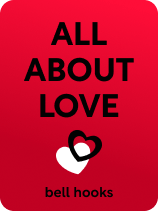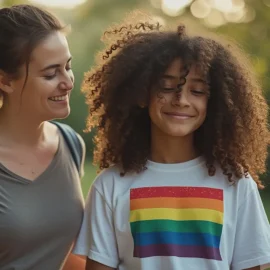

This article is an excerpt from the Shortform book guide to "All About Love" by bell hooks. Shortform has the world's best summaries and analyses of books you should be reading.
Like this article? Sign up for a free trial here.
What’s the true definition of love? How does bell hooks define love?
According to bell hooks in her book All About Love, we struggle to talk about love because we lack a shared definition of what love is. She insists that having a shared meaning is a critical starting point for creating a culture that’s more rooted in love.
Keep reading to learn what the true definition of love is, and what love isn’t.
What Love Is
In hooks’s view, the true definition of love comes from psychiatrist M. Scott Peck. In his book The Road Less Traveled, Peck defines love as “the will to extend oneself for the purpose of nurturing one’s own or another’s spiritual growth.”
hooks acknowledges the word “spiritual” may not resonate with everyone because of its religious connotations. However, she explains, spirituality does not inherently imply any religious affiliation. She clarifies that in this context, “spiritual” refers to an internal sense of self that goes beyond mind and body—what some people may call a soul or spirit, your innermost self.
In her discussion of Peck’s definition, hooks highlights his description of love as an active choice, emphasizing that it is not an innate quality or feeling but rather a decision to nurture growth in yourself and others. Genuine love requires committed action and discipline. We choose to commit because we understand that not committing will have a harmful effect on the growth of the relationship, but more importantly, the growth of the individuals in it.
Reciprocity
While not explicit in Peck’s definition, hooks explains that love is always an act of reciprocity, in that both people take responsibility for nurturing the relationship.
hooks argues that patriarchy has belittled this kind of investment in another person, relegating it to the responsibility of women. Instead of mutual care, patriarchy upholds the value of power and control. According to hooks, when power is the primary focus in a relationship, both men and women end up vying for control over the other person, whether that be through physical force, verbal abuse, financial control, or manipulation.
Trust
hooks argues that love is predicated on trust. We live in a society where lying has not only become normalized, but also encouraged. People lie every day—to save face, to avoid punishment, or to circumvent hurting someone else’s feelings. hooks explains that we learn from a young age that lying often serves us better than telling the truth.
What Love Isn’t
According to hooks, love that aligns with Peck’s definition is quite rare. More often, she says, love is distorted to emphasize the importance of power and control over reciprocity and trust. hooks explains that people often develop a harmful understanding of love based on interactions in their families of origin. For example, in some cases, children grow up experiencing verbal and physical abuse that’s justified as love, while other children are raised in overly permissive households where they’re allowed to do or get whatever they want, as if that’s an act of love. hooks argues that both scenarios contribute to a skewed understanding of love rooted in the dynamics of reward and punishment rather than a genuine commitment to another person’s spiritual growth.
hooks doesn’t blame families for not expressing love in healthy ways: She understands that many caregivers have learned a distorted version of love from their own families. To break this cycle of unhealthy love, she explains, we must learn and teach a new definition of love, one that centers spiritual growth and balances independence and connectedness to allow a positive self-image to flourish within a functional family environment. By embracing this new understanding of love, we can create a nurturing atmosphere conducive to personal growth and well-being.

———End of Preview———
Like what you just read? Read the rest of the world's best book summary and analysis of bell hooks's "All About Love" at Shortform.
Here's what you'll find in our full All About Love summary:
- How a commitment to love can reshape our society for the better
- The power of love from a feminist perspective
- Why romantic love is not the most important form of love






